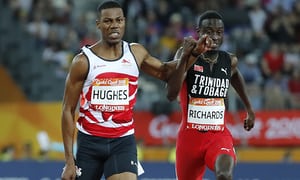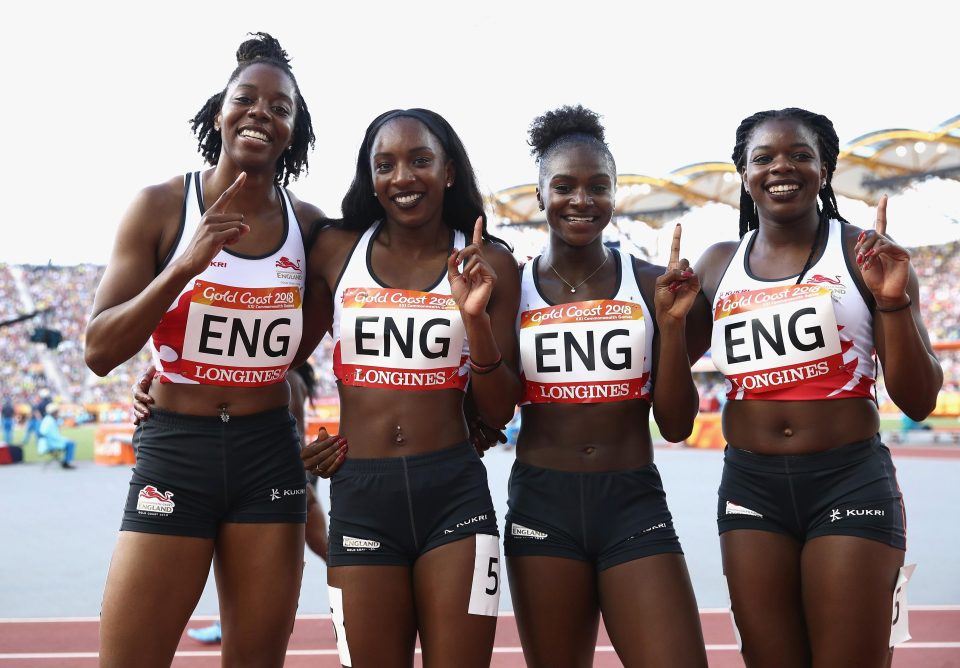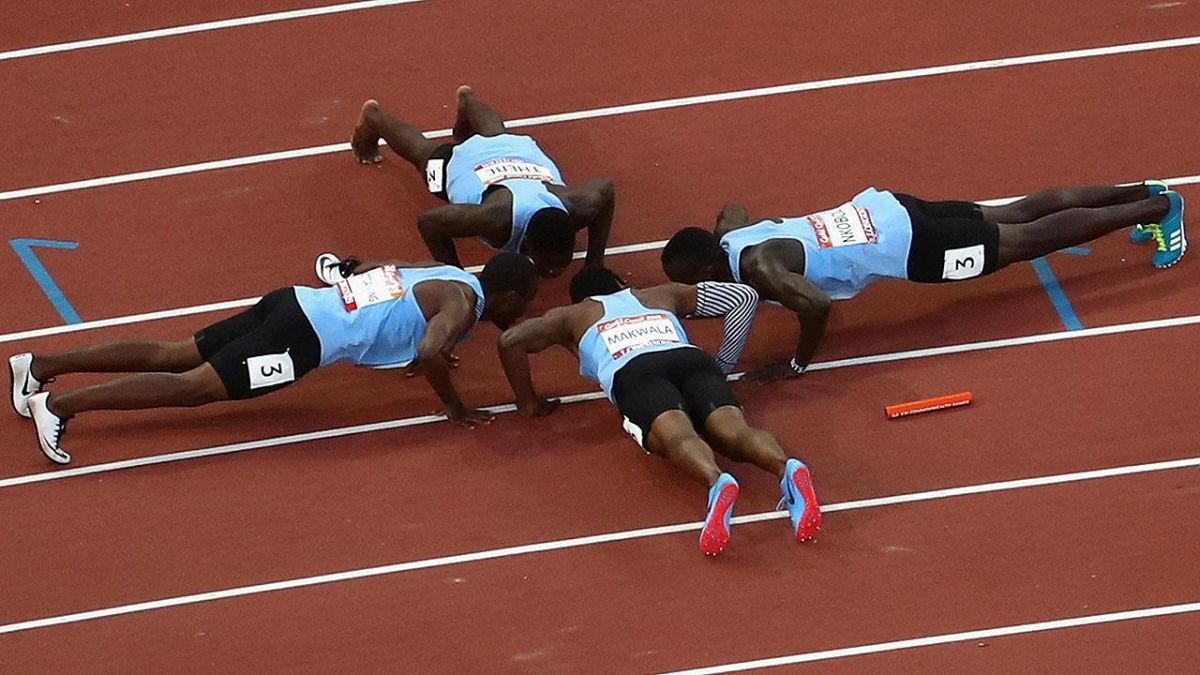
The final three days of athletics at the 21st Commonwealth games lived up to the standards of the first four, culminating in the curtain-drawing relay events which offered a measure of vindication for England – and boy was vindication needed. On Thursday, team England picked up where it had left off the day before, both delivering excellent results and frustration in abundance.
England’s second athletics gold finally came courtesy of Sophie Hahn – the ‘pocket rocket’ – who won her T38 100m final in a time a mere two milliseconds off her lifetime best. It seemed like England’s fortunes might finally be turning, though too late to check Australia’s impressive medal haul. Sure enough, Luke Cutts won pole vault bronze and KCL alumna Dina Asher-Smith landed a brilliant 200m bronze medal, holding off the challenge of Olympics champion Elaine Thompson in the home stretch. Shaune Miller-Uibo of the Bahamas won gold in that event, with Shericka Jackson of Jamaica claiming silver.
And then came the men’s 200m final. Englishman Zharnel Hughes ran a fantastic first 150m and appeared to have just survived the late surge of Trinidad and Tobago’s Jereem Richards to claim gold. However, after completing his lap of honour, he was informed of his disqualification for impeding Richards. Though it would be cynical to assume it was intentional, Hughes’ limbs were indeed flailing as he desperately tried to hold off his competitor’s challenge, and his arm made contact with Richards.

One man’s misfortunes was another’s joy though, and Northern Ireland’s Leon Reid was promoted from fourth – itself a fantastic result – to bronze. Elsewhere on the home nations front, Eilidh Doyle ran a predictably solid race to claim silver for Scotland in the 400m hurdles. In the men’s event, Kyron McMaster cruised to victory to hand the British Virgin Islands their first ever Commonwealth games medal.
Despite the disappointment of Hughes’ disqualification, England had very clearly found their groove, and the team’s good form was carried into the 800m. In the image of August’s world championships 800m final, in which France’s Pierre-Ambroise Bosse stunned everyone to win the title, the Commonwealth’s version did not disappoint. Home nations interest lay in Scotland’s Jake Wightman and England’s Kyle Langford. Coming around the final bend, both Brits looked all but dead and buried; however, Langford deployed his trademark kick and ate up the ground between himself and the three athletes in front of him in the final stretch, falling just five hundredths of a second short of overtaking Kenya’s Wycliffe Kinyamal for gold. Despite a PB and his first medal at senior level, the contrast between Langford and Australia’s third-placed Luke Mathews could hardly have been more pronounced: Mathews exuberantly led the crowd in a chant of ‘Aussie Aussie Aussie, Oi Oi Oi’, flag draped around his shoulders, while Langford slapped his legs in frustration at having just missed out on gold.
Come Friday, Katarina Johnson-Thompson jumped on the medal bandwagon to hand England their third athletics gold. Although her efforts seemed borderline lacklustre in a handful of the events (namely the shotput), she was dominant in enough events (the 200m, long jump and high jump) to ensure that the final 800m race was a mere formality. The young Liverpudlian looks poised to follow in the footsteps of national treasure Dame Jessica Ennis-Hill. Meanwhile, the 800 was anything but a formality for KJT’s compatriot Niamh Emerson, who finished quickest and sufficiently far ahead from her main rivals to steal the bronze medal from Australian Celeste Mucci.
Earlier that day, England’s men’s 4×100 relay team looked solid as they qualified fastest for the final. The athletics team’s demons clearly hadn’t been banished for good though, as Matt Hudson-Smith pulled up injured just 5 seconds into the 4×400 race and mere days after being disqualified from the individual event. Later on that day, neither Tiffany Porter nor Alicia Barrett were able to get in on medal action of the women’s 100m hurdles, won by Nigeria’s Oluwatobiloba Amusan.
With the relay events looming large, Morgan Lake claimed high jump silver for England, finishing second best to Saint Lucia’s Levern Spencer, while Neeraj Chopra claimed India’s first athletics gold of the games in the javelin with a massive 86.47m throw. When the relay events arrived, both the men’s and women’s team swept up gold for England, long jumper Lorraine Ugen brilliantly anchoring the women’s race despite knowing Jamaica’s Olympics Champion Ellaine Thompson would be hot on her heals. Likewise for the men’s race, anchor runner Harry Aikines-Aryeetey spoke of ‘running like a scared rabbit’, knowing that Yohan Blake – the word’s second fastest man – would be bearing down on him.

Despite the absence of the English team, who would have fancied their chances of winning a medal, the men’s 4×400 was a brilliant race from a neutral’s perspective. Coming into the final bend of the last leg, it was for all intents and purposes a five-way race for gold. However, Botswana’s Isaac Makwala comfortably changed gear and pulled away to win his country’s third athletics gold of the games, dropping to the floor with his teammates to perform his signature push-ups upon crossing the finish line. The surprise package was the Bahamas, their anchor runner just holding off the challenge of Jamaica to win silver. In the women’s event, England were tantalisingly close to a top-three finish, but were overtaken by Botswana in the final stages and finished fourth.

Finally, England’s Laura Weightman did excellently to finish third in the women’s 5000m and bring her team’s tally to five golds, four silvers and five bronzes (pending the marathon events on Sunday). Having just missed out on a medal in the men’s 800m by 0.23 seconds, Scotland’s Jake Wightman ran an astute last lap to claim bronze in the 1500m.
In the past week of athletics, there have been lessons aplenty for those preparing to run in LUCA’s first outdoors meet tomorrow at Parliament Hill. Remember, PBs mean nothing if you or your opponents don’t perform on the day; astute tactics can completely rubbish pre-race predictions; and come the relays, it is more a matter of getting the baton round the track safely (though still quickly) than bombing it and risking a DNF. Good luck!
